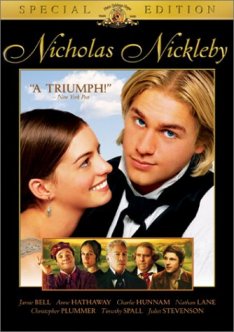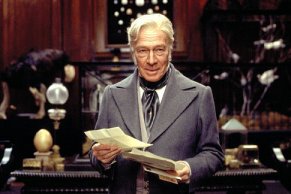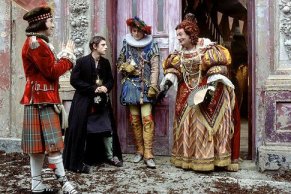Photo
gallery
Key
Scene:
Alan Cumming (Nightcrawler) attempting his famous highland
fling.
Why
cover an adaptation of Dickens when there's no robots, clones,
superpowers, or really any gory violence? Because this film
was simply one of my favorites of 2002.
The
extras on this DVD are not what makes it worthwhile, though
it is interesting to hear director McGrath talk about some
of the challenges in adapting such a massive novel. For
the most part, the extras are fluff, and so it really comes
down to this: is the movie any good? Oh, yeah, it is, but
in a gentler way than what you might usually find on Fanboy
Planet.
Young
Nicholas' family loses all their money in the stock market.
Seeking to somehow get by, the surviving members try to
sell their home (though nobody wants it) and move to the
big city. There they hope for pity from their uncle, a successful
stockbroker who colludes with his wealthy cronies in backroom
deals that tend to break families like The Nicklebys.
Sure,
it might just as well be called Enron America, but
Nicholas Nickleby is actually a mid-19th Century
novel by Charles Dickens. Former SNL writer Douglas McGrath
has managed to rip through to the book's very heart, creating
a breezy but topical film that proves to be one of the last
gems of 2002. (Okay, so it's opening in 2003, but really,
it still counts.)
Aside
from its timeliness, the film captures bits of everything
that makes Dickens a much-read (and much copied) author:
great characterization, great dialogue, and great plot.
In many ways, Dickens shares a sensibility with David Lynch.
Though Nicholas Nickleby doesn't venture into the
dream realm, it has just a firm grasp on the psychology
of society, and more than its share of grotesques.
|
|
|
"I've
just been nominated to head the SEC!"
|
McGrath has actually toned that down a bit, making cartoonish
figures into believable characters. The most outrageous casting
comes by using Barry Humphries (aka Dame Edna Everage) as
Mrs. Crummles, the ultimate stage mother. To give Humphries
equal time, he also gets a male role later in the film, as
twin to Timothy Spall. Somehow, both roles work without calling
attention to their gimmickiness. When casting Dickens, that's
no small feat.
A sprawling
novel (and a nine and a half hour stage play), the movie
version whips through a basic storyline of young Nicholas'
(Charlie Hunnam) efforts to find fortune and family. After
appealing to his wicked Uncle Ralph (Christopher Plummer)
for a job, he ends up as an assistant schoolmaster to the
one-eyed Wackford Squeers (Jim Broadbent).
At
Dotheboys Hall, Nicholas struggles to shine light and hope
on the otherwise abused students, making friends with the
crippled Smike (Jamie Bell). Together, the two escape to
adventure, ultimately reuniting the Nickleby family, finding
love and sorrow, and proving that good conquers evil.
What
keeps the film's morality from being cut and dried is its
acknowledgment (straight from Dickens) that it's never so
simple. (Though Nicholas believes it is.) Good people are
often, to put it bluntly, dorks. And Plummer clearly plays
Ralph Nickleby as a man not so much evil as unaware of the
ramifications of his selfishness. Though he pursues it whole-heartedly,
seeing the consequences bothers him all along the way.
If there is a stumbling block to enjoying this film, it comes
in Hunnam's performance as Nicholas. Completely earnest, Hunnam
borders on playing only one note. As a result, the times when
Nicholas explodes in anger come out of nowhere. A ridiculously
handsome actor, Hunnam used his looks to better effect on
last year's TV series Undeclared. In hindsight, what
should have been a seething build-up in this movie looks more
like a Tiger Beat pout. Of all the actors, Hunnam also has
the most difficult time delivering the Victorian dialogue
without sounding like recitation.
It's
a shame, really, because McGrath wisely lifts huge chunks
of Dickens' rich prose for his own screenplay. Beginning
with a profound yet hammy introduction by Nathan Lane, he
lets Dickens speak for himself, which in turn gives the
cast huge clues as to their characterization. Upon Ralph's
introduction, his sister-in-law pleads for pity, as her
husband has just died. He responds that husbands die every
day. Nicholas shoots back, "as do brothers," trying to dig
into his uncle's black heart. Coolly, Plummer responds,
"as do puppies." It's an exchange that rings as one of the
most incisive of the year.
There's
still plenty of room for cynicism in the movies. But every
now and then, it's cool to see a movie completely devoid
of it, as long as it's done more than competently. Nicholas
Nickleby achieves that mark, and more.
Coming
from McGrath, who admits in press notes that his year on
SNL was "…incontestably the worst year in the show's
history," the film proves that talent will eventually rise.
I'm still waiting for Joe Piscopo's magnum opus, though.
Rating:









